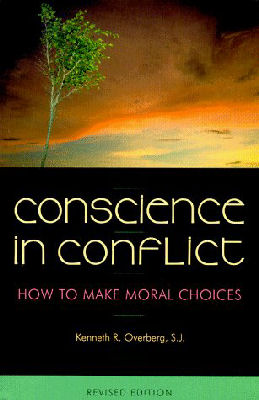
|
Posted May 22, 2006
Book: Conscience in Conflict: How to Make Moral Choices - Stem-Cell Research, Globalization, Terrorism, Euthanasia, Homosexuality Author: Kenneth R. Overberg, S.J. St. Anthony Messenger Press, Cincinnati, OH. 2006. Pp. 160 An Excerpt from the Introduction:
Making moral decisions is a lifelong challenge. Throughout our lives we confront moral dilemmas, asking again and again, "What ought I do?" The situations range from very intimate areas of sexuality and personal relationships to business ethics and medical issues to global questions of war and economics. We make decisions about the beginning and end of life - about artificial conception and contraception, about withdrawing life support and allowing a person to die. And we make decisions about an almost infinite number of issues in between, some major and some minor, but always regarding a dilemma which calls for a response. Frequently, the analysis of these dilemmas proves to be most demanding. Ethical questions are rarely black or white; they are almost always gray. The staggering advancement of technology, the complexity of cultural patterns, the pluralism of lifestyles and values all make moral decisions difficult. Very often there seems to be no easy answer. Even something as simple as the decision to read this book implies saying no to some other good, such as spending this time with a friend. Other choices are much more complex: a family's decision concerning appropriate medical treatment for a dying parent, for example. Yet moral decision-making remains a central part of our lives. Indeed, our responses shape who we are and who we are becoming - as individuals and as the human community. The complexity of moral dilemmas, therefore, is matched only by their significance. In confronting these issues, we make a statement about ourselves, affirming or denying our very humanity. Our choices and actions concerning war and drugs, abortion and racism, marriage and medicine build up or destroy our personal and communal humanity. Although each of us must make personal moral choices, we are not completely alone. Past human experience and wisdom have been formulated into laws, both civil and religious. Indeed, for the Christian, the Scriptures and the church provide helpful guidance for moral decision-making. Helpful, but at times ambiguous, for people sometimes find conflict not only between civil and religious laws but also between church rules and their own experience and insights. Law and authority play significant roles, but do not necessarily ease the complexity of contemporary morality. The purpose of this book, then, is to address the challenge of making moral decisions. We will reflect on the full meaning of that basic question each of us has asked so many times: "What ought I/we to do?" An Excerpt from the Book: A particular focus that holds together so many of these issues and questions is the consistent ethic of life. The late Cardinal Joseph Bernardin first articulated this perspective in the early 1980s as he worked to bring together those seeking an end to abortion and those trying to prevent nuclear war. Already in his first lecture on the consistent ethic of life, he realized that commitment to life cannot be limited to ne or two issues but must extend across the whole life span. Form womb to tomb, life must be protected, nourished and cherished. He stated: If one contends, as we do, that the right of every fetus to be born should be protected by civil law and supported by civil consensus, then our moral, political and economic responsibilities do not stop at the moment of birth. Those who defend the right to life of the weakest among us must be equally visible in support of the quality of life of the powerless among us: the old and the young, the hungry and the homeless, the undocumented immigrant and the unemployed worker. Such a quality of life posture translates into specific political and economic positions on tax policy, employment generation, welfare policy, nutrition and feeding programs, and health care. Consistency means we cannot have it both ways. We cannot urge a compassionate society and vigorous public policy to protect the rights of the unborn and then argue that compassion and significant public programs on behalf of the needy undermine the moral fiber of the society or are beyond the proper scope of governmental responsibility. Although this linking of issues has not always been popular with particular interest groups, the consistent ethic of life has become the centerpiece of American Catholic moral teaching. This life ethic does not easily fit an existing category. It appears "liberal" on some issues, "conservative" on others. It challenges Republicans, Democrats and independents to promote life in all issues. It confronts believers, calling them to live gospel values more faithfully and authentically in all aspect of their lives. Table of Contents: Part One: Contemporary Moral Theology 1. To be or not to be 2. Making moral decisions 3. Conscience and authority Part Two: Contemporary Moral Issues 4. Sexual ethics 5. Medical ethics 6. Social ethics |
|
